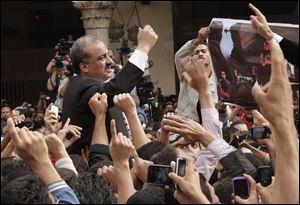
Egypt's Muslim Brotherhood leader denies 'terror' charges
8/27/2013
Protesters led by senior Muslim Brotherhood figure Mohammed el-Beltagy, chant slogans against the Israeli invasion of Gaza, in Al-Azhar mosque after Friday prayers, in Cairo, Egypt, in November, 2012. El-Beltagy is currently in hiding.
CAIRO — A fugitive leader of Egypt’s Muslim Brotherhood in a videotaped speech aired today denied accusations by the authorities and allied media that his group is waging a “terror” campaign.
Mohammed el-Beltagy’s address was aired by Al-Jazeera Mubasher Misr, an affiliate of the Qatar-based TV station, as the group plans new demonstrations, defying a crippling security crackdown that has put most of its senior and midlevel leadership behind bars and reduced once-massive street protests to scattered gatherings of several hundred.
El-Beltagy is himself wanted on accusations of inciting violence and has been hunted by authorities for nearly three weeks.
In his 18-minute message, el-Beltagy said that authorities were trying to turn a “political crisis” into a security problem by accusing his group of orchestrating a terrorism campaign. Egypt’s media, almost uniformly anti-Brotherhood after the closure of Islamist TV stations, have described the crackdown as a “war on terror.”
El-Beltagy went into hiding earlier this month after authorities violently broke up protest encampments held by supporters of President Mohammed Morsi, ousted in a July 3 coup. Hundreds died in the crackdown, including el-Beltagy’s daughter.
In a backlash, Morsi supporters attacked police stations, government buildings and churches. Hundreds of Brotherhood leaders and Morsi supporters were arrested, many accused of orchestrating violence.
Addressing the public, el-Beltagy said: “Don’t be fooled by these lies and deception that aim to label us with terrorism, violence, (and) killing ... at a time when the hands of the coup regime are drowned in blood.”
El-Beltagy said the military “regrettably sought to kill its own soldiers ... in an attempt to divert attention” from the deaths of Islamist prisoners — an apparent reference to an Aug. 19 attack that killed 25 police in the Sinai Peninsula, where Islamic militants have staged near-daily raids on army and security forces.
The current bout of violence is the worst in Egypt’s 2 ½ years of turbulent transition. It was set off when security forces backed by snipers and armored vehicles broke up two sprawling pro-Morsi protest camps on Aug. 14. More than 1,000 people, most Morsi supporters, were killed in the raids and other violence over the next several days.
The pro-Morsi camp is planning large new rallies on Friday to press for its demands to reinstate the ousted president, restore the now-suspended constitution, and bring the “leaders of the coup” to trial.
But the size of rallies has dramatically shrunk in the past week. Islamist groups allied to the Brotherhood have proposed a truce between the interim government and the Morsi camp in which the authorities would end the crackdown and the media campaign in exchange for an end to street protests.